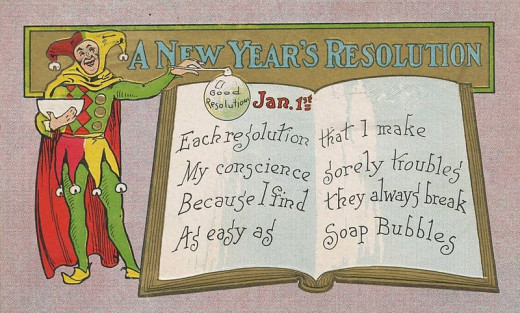How to Stick to Your New Year's Resolutions
New Year's Resolutions

Popular New Year's Resolutions
As the holiday season gets underway and New Years approaches, people across the globe are anticipating a way of reinventing themselves with their New Year’s resolutions. It is a form of self motivation in an attempt to better themselves.
According to USA.gov, the most popular New Year’s resolutions usually involve one of these listed:
- Drinking less alcohol
- Eating Healthier Foods
- Losing Weight
- Self improvement through better education
- Finding a better job
- Exercise More
- Paying down debt
- Reducing stress
- Giving up smoking
- Be more environmentally conscious
- Taking a vacation
- Saving money
- Be More Charitable
According to a Marist Poll for 2012, losing weight at 18% for the respondents was the number one New Year's Resolution. Exercising at 11% was number two. Saving more money and quitting smoking were tied for the number three spot at 9% each.
We are human beings and with our flaws and all, we seek opportunities to improve ourselves. As a New Year begins, more people than ever make resolutions to make a change within themselves for the better. A new year is a new beginning, a time for optimism and hope and a natural opportunity to start anew and to create positive change.
Resolutions typically take a short path that goes something like this - In the initial two weeks, the resolution is working very well. By mid February, most people abandon their promises. By the following December, people make a resolution and the cycle starts again.- Resolutions are easy to make, but harder to maintain.
Why Resolutions Are Not Always Kept
New Year’s resolutions are a cultural phenomenon, that many people join in on. Part of the problem is that people say a resolution, but don’t really mean it, or they are not ready to really change their habits. Some people want to make changes, but aren’t really sure how to go about doing it so that it fits their needs and they quit early on.
Some people set such high expectations and unrealistic objectivesthat they couldn’t possibly accomplish them. When a resolution is not in line with a person’s intrinsic view of themselves, they can’t possibly make the resolution have meaning. This actually could damage a person’s self esteem. So it is important to take seriously the promises of changes for the new year that you make yourself.
These are some of the reasons there is such a high failure rate to make their New Year’s resolutions permanent lifestyle changes. Another reason resolutions are not accomplished is the cause and effect relationship. Some people believe that if they make these changes their life will be altered for the better immediately. When this doesn’t happen, they get discouraged and go back to their old patterns. Some people are afraid that if they make these changes, they may be undeserving of a better life and so they quit on their resolutions. This “fear of success”, can be very self destructive.

Making Your New Year's Resolutions Stick
Resolutions are self initiated behavioral changes. John Norcross, a psychologist at the University of Scranton, has studied what makes some people succeed at their New Year’s resolutions. In his research, there was no correlation between the chosen resolution and success among his participants. In his 1998 to 2000 study, 19% had stuck to their resolution even after two years, even though they had varying new year intentions. There was also no correlation of success between age or gender.
It appeared from his research that successful change came about from the strategies used. Many used stimulus control. Stimulus control has to do with the absence or presence of situational cues that can trigger a behavior. For example, people who are trying to quit smoking will avoid areas at work where people congregate to smoke. People who want to exercise may buy themselves something after they work out at the gym. This would be a reward reinforcement for the behavioral change and helps keep someone motivated to continue.
Strategies and How They Affect Success of New Year's Resolutions
Those who were not successful used what he termed“consciousness-raising strategies." by using awareness to understand the causes and consequences. An example of this type of strategy is people who want to quit smoking think about the health consequences of picking up a cigarette.
Thinking about the effects did not always stop the behavior. This requires more willpower and greater relapse. Emotionally their commitment may start to falter and the external and personal pressures may lead them to abandon the attempted change and go back to their old habits. In order for people to succeed and sustain their resolution they may analyze their actions and re-evaluate their behavior in order to keep their self confidence. It is also helpful for people in this stage to ask for help from others.
People who stick to their resolutions for the longer term have entered a maintenance stage where they are able to avoid the temptations that could make them slip backwards. In the maintenance stage it is fine to keep the status quo, and appreciate how much progress they have already made. In this stage, successful resolutions come about because these people have acquired new skills that enable them to deal with the things that could make them relapse.
Are You Ready to Make a Change?
By developing coping strategies, they are equipping themselves with tools to keep their new year’s promise. Their belief that their resolution is worthwhile, has a purpose and a deeper personal meaning gives them the motivation and strength to persevere. Being patient and realistic is important qualities, because it takes a long time to change old habits and develop patterns of behavior in its place. It takes a long time and a lot of practice to form these new habits and make them second nature, at the same time that the bad habits are secretly yearning to return. Resisting temptation and keeping on track is an uphill battle, where people naturally regress a little, but then continue to progress.
One big predictor in being able to stick to New Year’s resolutions for the long term, the study showed, was the person’s own belief in themselves and their ability to succeed at what they are doing. Albert Bandura, a noted psychologist termed this as self efficacy.
How ready a person is to change is also a major factor in sticking to their resolutions. In another study Norcross did in 2002, he found that people in the study who were psychologically ready to make the change were ten times more likely to stick to their resolution than those who were not ready to take action.
Getting Beyond Setbacks
In order to make any changes, a person must alter their behavior. Every behavior is precipitated by a thought. So here comes my saying again. Change your thinking, change your world. When a person changes their thinking patterns, new neural pathways and brain impressions are made. Neuroscientists, Antonio Damsio and Joseph LeDoux with Stephen Hayes, a psychotherapist have proven this through MRIs that take scans of the brain.
Almost everyone has a setback along the way of change. The difference between those that succeed at this self imposed behavior and those that don’t, is what the person does when they do have a set back.
Successful people don’t view the relapse as the end to it all. They view it as falling into temptation and become more committed to not letting it happen again. The people that fail at their resolution view this setback with an all or nothing attitude. They view their moment of weakness as an inability to move forward and halt any progress they have made toward their resolution. .
Some people want to fail at their New Year’s resolution and look for ways to get out of their promise so they avoid any risk of being in the same situation in the future. They adapt a mentality of it is better to fail sooner than later.
Still from the studies Dr. Norcross has done, people who make resolutions are “10 times more likely to successfully change their behavior than those who do not”. His findings have shown that about half of the population makes some kind of resolution for the New Year. That means some of us are bound to make permanent changes in our habits and behaviors, and that is a good thing.
How to Stick toYour New Year's Resolutions
Here are some tips on how to stick to your New Year’s resolution:
- set one resolution, not several to make it easier to focus. Success is more likely if you start small and make it real, than to set out to do something grandiose that may be too much for you to follow through on.
- change one behavior at a time. Some resolutions take several changes, and it helps to let yourself adjust to each change.
- make sure you specify what you want to do - if you want to save more money this year, tell yourself how much you want to save each week or each month. Make it a specific amount, but make sure it is very realistic so that it is doable.
- you don’t have to wait for New Year’s to make a resolution, you can make them all year long and work on them all year long.
- Break down what your resolution involves into small pieces so that .you accomplish what you set out to do in small steps.
- Tell someone about your resolution so that you are accountable to them and in a way are reporting your progress. Talking about what you want to do, makes it more real, and adds to your own commitment to do this. Having to explain why you didn’t achieve can make you more obligated to your own promise. Just be cautious about who you tell. Make sure to reach out only to people who are supportive and non judgmental. Ask for help when you need it.
- Congratulate yourself for the small accomplishments and minor milestones you achieve so that you keep yourself motivated and can see your progress.
- Be kind and forgiving to yourself for any relapses and errors you may make. Slipping back happens to most people, forge ahead with a renewed commitment.
- Think positive thoughts on a regular basis so that you encourage new behaviors and create those new neural pathways in your brain, which will lead to longer term change of habits.
- Keep yourself focused on today. What is something you can do today, right now. It is the small step that lead to the bigger resolutions.
- Have fun along the way. If you take things too seriously, you won’t give yourself the flexibility to make mistakes, or the forgiveness for any possible relapses.
If you are making a resolution, make it something near and dear to you heart. Your chance of succeeding will improve greatly. If you make a New Year’s resolution, just to say it, and don’t mean it, well, how could you expect it to keep it. When you make a resolution, mean what you say and say what you mean.
Resolutions and New Year's
New Year's, perhaps more than any other time of year gives us ideas that we can all make a new start. New Year's is often a time to reflect on who we are, on our personal desires, our hopes and our dreams, and a better tomorrow. In anticipation of a new year, we hope we too, can leave a part of our old selves behind in the past, and make improvements that will bring greater happiness to ourselves as a new year begins.
As you strive towards change that has meaning to you, it is not important how big your reach is, it is important that you take a step at a time, and you recognize even the smallest of your accomplishments.












